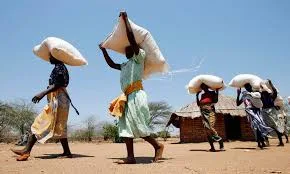The war in Ukraine threatens the entire world peace, especially in Africa, which throughout its history has been living in fragile security conditions. At the top of the reasons for this threat is the war’s infringement on the food security of the continent, the disruption of the dispute between Russia and America, the work of the United Nations, and the competition over the Sahel and Libya.
Africa today lives more than ever before under the threat of widespread violence and the outbreak of powerful social and political clashes. This is due to the bad effects of the war in Ukraine on it, in addition to the fragile security situation in which the continent has been languishing for decades.
The Russian attack on Ukraine and Western sanctions on Moscow directly threaten African food security, which depends for the most part on wheat from the two warring countries for its daily bread. This is making matters even more difficult for the continent, which, like the rest of the world, is suffering the effects of inflation and supply chain disruptions due to two years of the Corona pandemic.
In addition to this threat, another danger is the blockage that the United Nations may know as a result of the Russian-American rift over the background of the war, which may paralyze UN peacekeeping missions and humanitarian aid in the African continent. The risk of an outbreak of violence in the Sahel also increases with the escalation of competition between Paris and Moscow over the region.
Hunger wars and social clashes
The African continent depends heavily for its food on imports of Russian and Ukrainian wheat. In 2020, wheat represented 90% of Russian exports to Africa, which were estimated at $4 billion. Ukrainian exports to the countries of the continent during the same year amounted to $2.9 billion, with 48% of wheat and 31% of corn, and sunflower seeds and soybeans making up the rest.
While the military operations are more targeting the eastern Ukrainian region, the main home of these crops, Western economic sanctions are hitting Russian exports in death, and thus threatening food imports to the brown continent from these two countries to be interrupted. In addition, the prices of these products in the world market are inflated for the same reasons, given that the crops of Russia and Ukraine together represent 14% of the world's wheat production and a quarter of global exports.
Faced with this reality, and according to an article in the magazine "Foreign Policy", the exacerbation of food insecurity "in politically unstable countries such as Libya may lead to a deterioration of the security situation already. In many other countries, it can lead to conflict and increased ethnic tensions, destabilization of governments and widening cross-border crime scene.
The article stresses: “These scenarios should not be taken lightly, as it has only been a decade since the Arab Spring uprisings, in which rising food prices sparked the revolution in Tunisia and Egypt. As more recently, one only needs to consider to Kazakhstan to see how quickly the price of a basic commodity, in this case fuel, can result in protests and violence."
A blockage at the United Nations and a conflict of interests
The recent vote on the resolution condemning the Russian attack on Ukraine in the General Assembly revealed the discord experienced by the Security Council, which failed in two attempts to vote on the resolution, due to the great clash between its permanent members: between France, Britain and the United States of America on the one hand, and Russia on the other hand. And their quick tendency to activate the veto in order to score diplomatic points on each other.
This discord threatens to disrupt the joint action of these countries in a number of files, including those involving the African continent, such as disrupting peace missions and UN envoys to conflict areas and humanitarian relief. This was evident in France's recent intervention to prevent the United States and Russia from signing a statement supporting the continuation of humanitarian assistance to Syria, claiming that the current time is not appropriate for taking joint positions with Moscow.
Friction between Russia and NATO countries over the Libyan file could weaken UN efforts to keep the 2020 peace agreement on track, and thus contribute to the country's descent back into violence.
It will make the Sahel a line of conflict between the two sides, which has been living for months on the impact of French and Russian competition, represented by the "Wagner" mercenaries. Which produced a series of successive coups in Mali, Burkina Faso and Guinea, and also claimed the life of the Chadian president, who is close to Paris, at the hands of Russian-trained rebels.
This will obstruct the agreement on the UN mandates for sanctions, peacekeeping and mediation in the Sahel and all conflict areas on the continent.
In this regard , an article for the American "Foreign Affaires" magazine warned, "It will be difficult for American and European diplomats to work constructively with their Russian counterparts, if Ukraine has a long war or open Russian military occupation, especially if the West continues its sanctions against Moscow."



